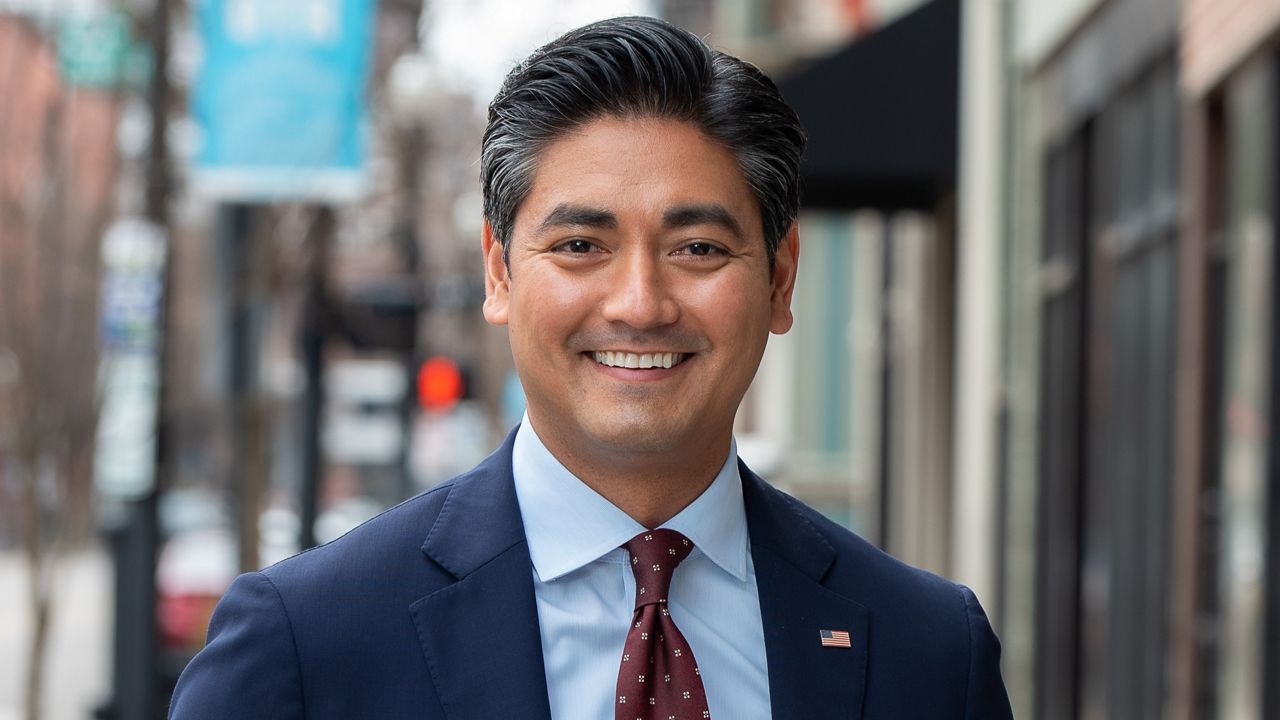Glenn Youngkin won the Virginia governor’s race Wednesday, tapping into culture war fights over schools and race to unite former President Donald Trump’s most fervent supporters with enough suburban voters to become the first Republican to win statewide office in a dozen years.
Meanwhile, in the other high-profile governor’s race of the night, Democratic Gov. Phil Murphy’s bid for re-election in New Jersey, a state Biden won by 15 points, is still too close to call.
While experts agree that no one race is a guarantee for how future elections will pan out, the two races are a warning sign for Democrats as they attempt to hold on to their Congressional majority in the 2022 midterm elections.
The elections were the first major tests of voter sentiment since Biden took office and suggested growing frustration. They also underscored that, with Trump out of office, Democrats can’t center their messages on opposition to him. The results ultimately pointed to a potentially harsh reality ahead for Democrats as they try to maintain thin majorities in Congress.
An upset in Virginia
The mood among Republicans in the Old Dominion was celebratory.
“This is the spirit of Virginia coming together like never before,” Youngkin told cheering supporters in a hotel ballroom in Chantilly, about 25 miles west of Washington
Youngkin promised to lead not just from the state capital but with “a vision where Virginians’ power, the power that has historically resided in the marble halls in Richmond is spread out, spread out into the kitchen tables that are held together with the bond and the spirit of liberty and freedom.”
A political neophyte, Youngkin was able to take advantage of apparent apathy among core Democratic voters fatigued by years of elections that were seen as must-wins. He successfully portrayed McAuliffe, a former Virginia governor, Democratic National Committee chairman and close friend of Bill and Hillary Clinton, as part of an elite class of politicians. He also seized on a late-stage stumble by McAuliffe, who during a debate performance suggested parents should have a minimal role in shaping school curriculums.
Perhaps most significantly, Youngkin prevailed in a task that has stumped scores of Republicans before him: Attracting Trump’s base while also appealing to suburban voters who were repelled by the former president’s divisive behavior.
Youngkin appears to have successfully walked the tightrope of winning the former presdient’s endorsement while keeping him at an arm’s length.
During the campaign, Youngkin stated his support for “election integrity,” a nod at Trump’s lie that the 2020 presidential election was stolen, while also focusing on education and business-friendly policies. He never campaigned in person with Trump, successfully challenging McAuliffe’s effort to cast him as a clone of the former president.
That approach could provide a model for Republicans competing in future races that feature significant numbers of Democratic or independent voters.
no other contest in this off-year election season received the level of national attention — and money — as the governor’s race in Virginia, a state with broad swaths of college-educated suburban voters who are increasingly influential in swaying control of Congress and the White House.
A former business executive, Youngkin poured vast amounts of his personal fortune into a campaign that spent more than $59 million. Youngkin ran confidently on a conservative platform. He opposed a major clean energy mandate the state passed two years ago and objected to abortion in most circumstances.
He also opposed mask and vaccine mandates, promised to expand Virginia’s limited charter schools and ban critical race theory, an academic framework that centers on the idea that racism is systemic in the nation’s institutions and that they function to maintain the dominance of white people. In recent months, it has become a catch-all political buzzword for any teaching in schools about race and American history.
McAuliffe tried to energize the Democratic base by highlighting abortion, denouncing a new Texas law that largely banned the procedure and warning that Youngkin would seek to implement similar restrictions.
Youngkin didn’t discuss abortion much publicly, and a liberal activist caught him on tape saying the issue couldn’t help him during the campaign. He said an election win would allow the party to “start going on offense” on the issue.
While McAuliffe pulled on the star power of a host of national Democrats, including former President Barack Obama and ex-Georgia governor candidate Stacey Abrams, Youngkin largely campaigned on his own, focusing on issues he said were important to Virginians.
Youngkin also proved perhaps most successful in deflecting McAuliffe’s efforts to tie him to Trump and the former president’s divisive political style.
Polls showed the race tightening after McAuliffe said during a late September debate that he didn’t think “parents should be telling schools what they should teach.” That prompted Youngkin to run hundreds of TV ads on the statement and to focus on his own pledges to make school curricula less “un-American” and to overhaul policies on transgender students and school bathrooms.
The race took an especially bitter turn last week, when Youngkin ran an ad featuring a mother and GOP activist who eight years ago led an effort to ban “Beloved,” the Pulitzer Prize-winning novel by Black Nobel laureate Toni Morrison, from classrooms.
McAuliffe accused Youngkin of uncorking a “racist dog whistle,” but Youngkin said Virginia parents knew what was really at stake — and so did families across the country. That was a nod to how tapping into parental activism could work for the GOP next year and in future election cycles.
“America is watching Virginia,” Youngkin said as part of his closing argument. “And America needs us to vote for them too.”
Historic wins nationwide
Elsewhere, a number of historic victories: New York City elected its second black mayor in former police captain Eric Adams. Boston voters elected Michelle Wu, the city’s first female and Asian American mayor. Cincinnati picked its first Asian American mayor, Aftab Pureval. In Pittsburgh, Pennsylvania’s second-largest city, Democrat Ed Gainey was elected its first Black mayor.
With a centrist message crafted around public safety, Adams won a competitive Democratic primary in June and cruised to victory against Republican Curtis Sliwa.
“This campaign was for the underserved, the marginalized, the abandoned [who] have been betrayed by their government,” Adams said.
Adams appeared alongside New York’s Gov. Kathy Hochul at his victory party and delivered a welcome message to New Yorkers: After years of an acrimonious relationship between their predecessors, Mayor Bill de Blasio and Gov. Andrew Cuomo, their successors pledged “a whole new era of cooperation.”
“We will fight for you, not fight each other anymore,” Hochul said.
Minneapolis police reform
Minneapolis voters rejected a ballot initiative that sought to overhaul policing in their city, where George Floyd was killed by a white police officer on Memorial Day 2020, sparking the largest wave of protests against racial injustice in generations. The initiative would have replaced the police force with a Department of Public Safety charged with undertaking “a comprehensive public health” approach to policing.
Supporters said a complete overhaul of policing was necessary to stop police violence. Opponents said the proposal had no concrete plan for how to move forward and warned it would leave some communities already affected by violence more vulnerable as crime is on the rise.
Those opponents welcomed the amendment’s defeat but stressed the urgency of transforming policing in the city even without it.
“Tonight Minneapolis voters have made clear that we want a planful approach to transforming policing and public safety in our city that needs to include meaningful consultation with the communities that are most impacted by both violent crime and by over-policing,” said Leili Fatehi, manager of the All of Mpls campaign.
The ballot question called for a new Department of Public Safety to take “a comprehensive public health approach to the delivery of functions” that would be determined by the mayor and City Council. Supporters argued it was a chance to reimagine what public safety can be and how money gets spent. Among other things, supporters said, funding would go toward programs that don’t send armed officers to call on people in crisis.
Democratic Mayor Jacob Frey was also in a tough fight for a second term, facing a bevy of opponents who have attacked him for his leadership in the wake of Floyd’s death. Frey opposed the policing amendment. Two of his leading challengers in the field of 17 candidates, Sheila Nezhad and Kate Knuth, strongly supported the proposal.
With nearly complete returns, Frey had about 43% of the first-choice vote. He needed more than 50% to win outright under the city’s ranked-choice voting system, with the city to begin sorting second- and potentially third-choice votes Wednesday morning. Nezhad and Knuth were both near 20%.
A jubilant Frey didn’t claim victory when he spoke to supporters late Tuesday but called it “a really good night” and said the city had sent a message to the entire country that true change requires hard work, not slogans.
“There will be many that will try to argue that this is a blow to reform. That is dead wrong,” Frey said. “Reform has begun, but it must continue.”
Dead heat in the Garden State
New Jersey Democratic Gov. Phil Murphy and Republican Jack Ciattarelli were virtually deadlocked early Wednesday after a campaign centered on the incumbent’s progressive policies and handling of the pandemic.
A winner has not yet been declared in the race as votes are still being counted.
Murphy had been leading in the polls, has a 1 million-voter registration advantage and had more cash in his campaign coffers than Ciattarelli in the final days of the race. But the Republican has far surpassed the Republican nominee from four years ago in fundraising and has seen the gap in public polls move in his favor — if only by a few points.
“We’ve sent a message to the entire nation,” Ciattarelli said, though acknowledging it was too early to declare victory. “This is what I love about this state: Every single time it’s gone too far off track, the people of this state have pushed, pulled and prodded it right back to where it needs to be.”
Murphy, the incumbent, is also looking to make history: No Democrat has won reelection as governor in New Jersey since Brendan Byrne in 1977, and the party opposite the president’s has won the New Jersey governorship going back to 1985.
“When every vote is counted, and every vote will be counted, we hope to have a celebration,” Murphy told supporters.
Murphy has campaigned as a solid progressive, with a record to show for it. He signed bills into law that expanded voting access, provided for taxpayer-funded pre-K and community college, hiked the minimum wage to $15 an hour over time along with opening up the state to renewable energy like wind power.
Ciattarelli’s campaign seized on comments Murphy made that New Jersey probably isn’t for voters whose top issue is taxes, casting the governor as out of touch with a concern many prioritize. He has called the Democrat a “tax and spend liberal” in a state with the highest real estate property taxes in the country.
He also sought support from those who disagreed with Murphy’s handling of COVID-19. At a recent campaign rally in Hazlet when someone in the audience asked about mandates, Ciattarelli said there’d be none under his administration — an allusion to mask and vaccination mandates.
Polls showed Murphy got solid support for his handling of the COVID-19 outbreak, which hit New Jersey hard in early 2020 and resulted in the deaths of more than 25,000 people. About a third of those deaths occurred in nursing and veterans homes. But the state also excelled at getting people vaccinated and was quick to become one of the states with the highest percentages of eligible people to be fully vaccinated.
A lawsuit filed Tuesday evening by the American Civil Liberties Union of New Jersey, based on social media posts and local news reports, alleged that dozens of voters were turned away from polls. In some places, that was because electronic tablets used to check in voters struggled to connect to the internet.
The suit, which had sought to extend voting until 9:30 p.m., was denied by the court, the civil rights organization said
Ohio House races a wash, with both parties scoring a win
In Ohio, a pair of House races split for each party, with Republican Mike Carey, a Trump-backed coal lobbyist, and Democrat Shontel Brown retaining a seat for their respective party.
Carey won an open U.S. House seat in central Ohio, defeating Democratic state Rep. Allison Russo, a public health policy consultant, in the 15th Congressional District, after the most competitive race there in years.
“We have too many career politicians in Washington,” Carey told supporters. “That’s the last thing that I will ever be.”
Meanwhile, Brown, a Cuyahoga County Council member who also chairs the county Democratic Party, coasted to victory in the Cleveland-area House seat formerly held by Marcia Fudge, who stepped down to become housing and urban development secretary in the Biden administration.
“I am committed to going to Washington as a unifier, and will work with President Biden and Democratic leaders in Congress to lead a swift health and economic recovery from the pandemic for Ohioans,” she said.
Both winners will fill the remainder of their predecessors’ terms, which run until January 2023. They must face reelection again next year under a congressional map that’s being redrawn to hold onto the seat.
The election results will leave Democrats with a 221-213 advantage over Republicans in Congress.
A third open congressional seat in Florida, where primaries were being held Tuesday, also is very likely to remain status quo and in Democratic hands.
Eleven Democrats were on the ballot in Tuesday’s primary special election for the seat of Democratic Rep. Alcee Hastings, who died in April after suffering from pancreatic cancer. One of the candidates is state Rep. Omari Hardy, who was 3 years old when Hastings was elected in 1992. Hastings was the longest-serving member of Florida’s congressional delegation.
Republican Jason Mariner won the Republican nomination to run for the 20th Congressional District seat, but the district is heavily Democratic.
The winner of the Democratic primary is considered a lock for January’s general election, but results were too close to call Tuesday night after most of the votes had been counted in the South Florida district.
The district is a majority Black and covers parts of Broward and Palm Beach counties.
The Associated Press contributed to this report.




